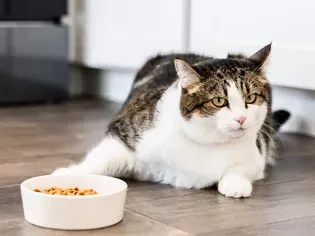Why Is My Cat Not Eating?
Updated on 04/26/24

Why Is My Cat Not Eating? A Comprehensive Guide to Understanding Your Feline's Appetite
Cats are notoriously finicky eaters, but when a cat suddenly stops eating, it can be a cause for concern. Understanding the reasons behind your cat's diminished appetite can help you address the issue promptly and effectively. This comprehensive guide will delve into the potential factors that may be influencing your cat's eating habits and provide practical solutions to restore their appetite.
Medical Conditions:
* Dental Disease: Tooth pain or infections can make eating uncomfortable for cats. Check for broken or loose teeth, swollen gums, or excessive drooling.
* Gastrointestinal Issues: Inflammatory bowel disease, pancreatitis, or parasites can cause nausea, vomiting, and loss of appetite.
* Metabolic Disorders: Conditions like diabetes or liver disease can alter appetite and metabolism.
* Kidney Disease: Cats with kidney problems may lose appetite due to uremia, a buildup of toxins in the blood.
* Cancer: Tumors in the digestive tract or other organs can affect appetite.
Environmental Factors:
* Stress: Changes in environment, new pets, or loud noises can cause stress-induced anorexia.
* Medications: Some medications, such as antibiotics or steroids, can have side effects that include loss of appetite.
* Litter Box Issues: Dirty or inaccessible litter boxes can deter cats from using them and lead to appetite loss.
* Competition: Multiple cats in a household may compete for food, resulting in some cats not getting enough to eat.
* Food Preferences: Cats can develop preferences for certain foods and reject others.
Behavioral Issues:
* Boredom: Cats may stop eating if they are bored and not mentally stimulated.
* Emotional Upset: Grieving a loss or adjusting to a new situation can cause emotional distress and affect appetite.
* Eating Disorders: In rare cases, cats may develop eating disorders such as pica (eating non-food items) or anorexia nervosa.
Diagnosing the Underlying Cause:
If your cat has stopped eating for more than 24 hours, it is crucial to seek veterinary attention. Your veterinarian will perform a physical examination, ask about your cat's symptoms, and may recommend diagnostic tests such as:
* Bloodwork
* X-rays
* Ultrasound
* Fecal analysis
Treatment and Management:
Depending on the underlying cause, treatment may involve:
* Medical Management: Addressing medical conditions with medications, surgery, or dietary changes.
* Environmental Adjustments: Reducing stress, providing accessible litter boxes, and enriching the environment with toys and interactive play.
* Behavioral Modification: Using positive reinforcement to encourage eating, addressing emotional issues, or consulting a veterinary behaviorist.
* Dietary Modifications: Trying different foods, offering small, frequent meals, or consulting with a veterinary nutritionist.
Preventing Appetite Loss:
* Regular Veterinary Checkups: Monitor your cat's health to detect potential underlying conditions early on.
* Stress Management: Provide a comfortable and predictable environment.
* Healthy Diet: Offer a nutritionally balanced diet that meets your cat's needs.
* Environmental Enrichment: Engage your cat with toys, scratching posts, and interactive play sessions.
* Gradual Changes: Introduce new foods or environmental changes gradually to minimize stress.
Conclusion:
Understanding the reasons behind your cat's decreased appetite is essential for effective treatment. By addressing medical conditions, environmental triggers, and behavioral issues, you can help restore your cat's normal eating habits and ensure their well-being. Remember to consult your veterinarian promptly if your cat has a sudden or persistent loss of appetite to facilitate a timely diagnosis and appropriate management.
Explore More Pets

Cat Behavior Problems
How to Stop Aggression in Kittens

Long-Haired Cat Breeds
Siberian Cat: Breed Profile, Characteristics, & Care

Cat Behavior Problems
How to Stop Kittens From Scratching and Biting

Long-Haired Cat Breeds
Turkish Angora: Cat Breed Profile, Characteristics & Care

Basic Training
How to Socialize Your Kitten

Short-Haired Cat Breeds
Cute Pictures & Facts About Calico Cats & Kittens

Litter Box Training
Training Your Kitten to Use the Litter Box

Long-Haired Cat Breeds
10 Fun Facts About White Cats